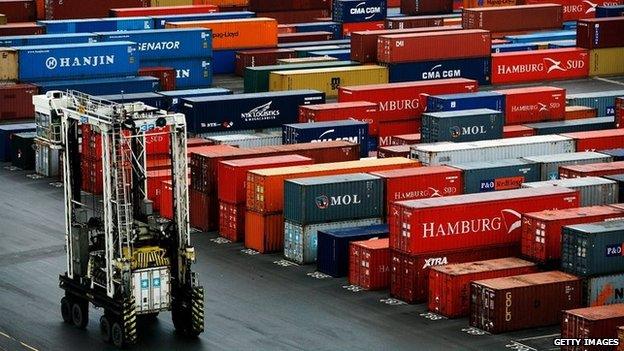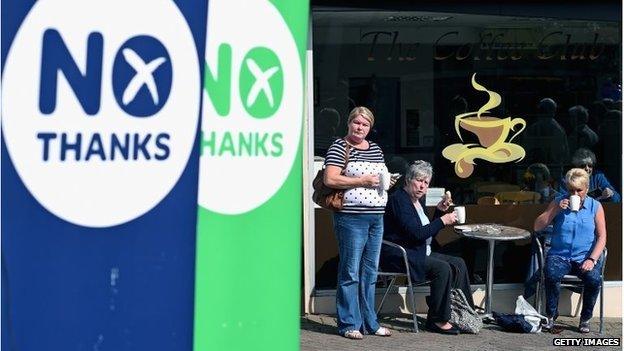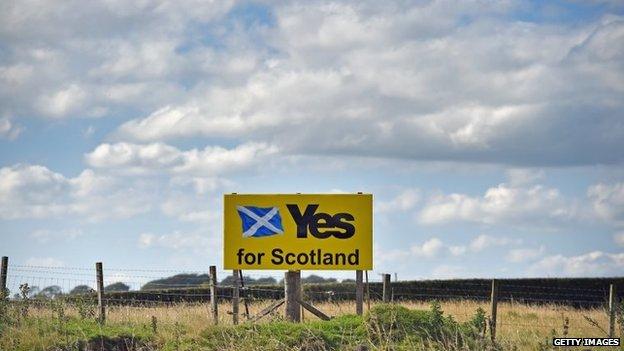Anti-independence businesses make their voice heard
- Published
- comments

After months of sotto voce claims that some businesses were simply too scared to put their head above the independence parapet, tonight comes the most significant move by anti-independence members of the UK business community ahead of the September vote.
A letter signed by 133 businesses with interests around the globe claims that the uncertainty of a Yes vote is "bad for business".
The signatories come from across the spectrum - banking, mining, engineering, food, whisky, technology and a smattering of SMEs. Some have aired anti-independence opinions before. Many are new.
The letter is signed by - among others - Douglas Flint, the chairman of HSBC; Andrew Mackenzie, the chief executive of the mining giant, BHP Billiton; and Sir John Grant, executive vice president of policy at the energy company, BG Group (and formerly the UK government's representative in Brussels).
Audrey Baxter, executive chairman of Baxters Food Group; Simon Thomson, the chief executive of Cairn Energy; and Ian Curle, the chief executive of Edrington, which owns the whisky brands The Macallan and The Famous Grouse, also lend their support.
It will be published in Wednesday's Scotsman newspaper.
The letter was organised by Keith Cochrane, the chief executive of the engineering firm, Weir Group, who has already warned of "substantial risks" if Scotland votes for independence. Its backers say that no political organisations have been involved in putting together the list.

Better together campaigners say jobs are at stake
One source said that it grew out of a "frustration" about what is perceived as a lack of cohesiveness about the business and independence debate.
The signatories account for around 50,000 jobs in Scotland, I have been told, from the large such as Babcock ship building to small engineering firms in Glasgow's east end.
Supporters of an independent Scotland can point to their own phalanx of supporters from business and economics, of course.
The former chairman of The Royal Bank of Scotland, Sir George Mathewson, has said that Scotland's vital financial services sector - for example - would flourish if Scotland votes yes.
'Financial advantage'
"There is nothing to suggest that being part of a smaller country hinders a financial services industry. Switzerland, for example, has - in Geneva and Zurich - not one, but two of the world's Top 10 financial centres. Singapore, with 5 million people, is ranked 4th," he has said.
"Investment is an increasingly global business, where success depends much more on people than on borders."
The economist and former head of Scottish Enterprise, Sir Donald MacKay, has argued that an independent Scotland would be in better fiscal shape than the UK is at present.
"An independent Scotland should use that financial advantage to invest in re-engineering our economy towards industrial, manufacturing and trade-able services development," he has argued.

Yes campaigners argue there are economic advantages to independence
Jim McColl, one of the Scotland's richest men and head of the engineering investment business, Clyde Blowers Capital, has revealed that he's so enthusiastic about independence he would consider moving back to Scotland in the event of a Yes vote. For the moment, at least, Mr McColl lives in Monaco.
Willie Walsh, the chief executive of IAG, owner of British Airways, also says that independence could well be good for Scotland.
I wouldn't be surprised if some more names are revealed this week.
Both sides of the debate have made the obvious point that it is up to the voters to decide.
'Much at stake'
With this letter voters will certainly have a clearer understanding of the issues that are worrying those businesses concerned about a possible yes vote.
Those coalesce around five key subjects - the currency, an independent Scotland's relationship with the European Union, the tax and regulation changes that may be brought in post-independence, pensions and how exports may be affected (an issue linked to the EU debate).
The letter says that "much is at stake": "Our economic ties inside the United Kingdom are very close and support more than a million Scottish jobs.
"As job creators we have looked carefully at the arguments made by both sides of the debate.
'Balance sheet'
"Our conclusion is that the business case for independence has not been made."
I am told that this is not the start of a new campaign by businesses against independence - but is a one off.
It does, though, come ahead of a CBI dinner in Glasgow on Thursday evening at which Sir Mike Rake, the president of the CBI and chairman of BT Group, is likely to make similar arguments against independence.
Business for Scotland countered tonight, putting out this statement: "Business for Scotland has 2,500 members who run businesses in Scotland, employ people across the country in a range of industries, and all believe that Scottish independence is in the best interests of Scotland and Scottish business.
"It's a position reached after looking at the facts and figures and realising that, from a simple balance sheet point of view as well as other considerations, our best interests lie in becoming an independent country."
It will be for the Scottish voters to decide how much weight they give either side in this debate.